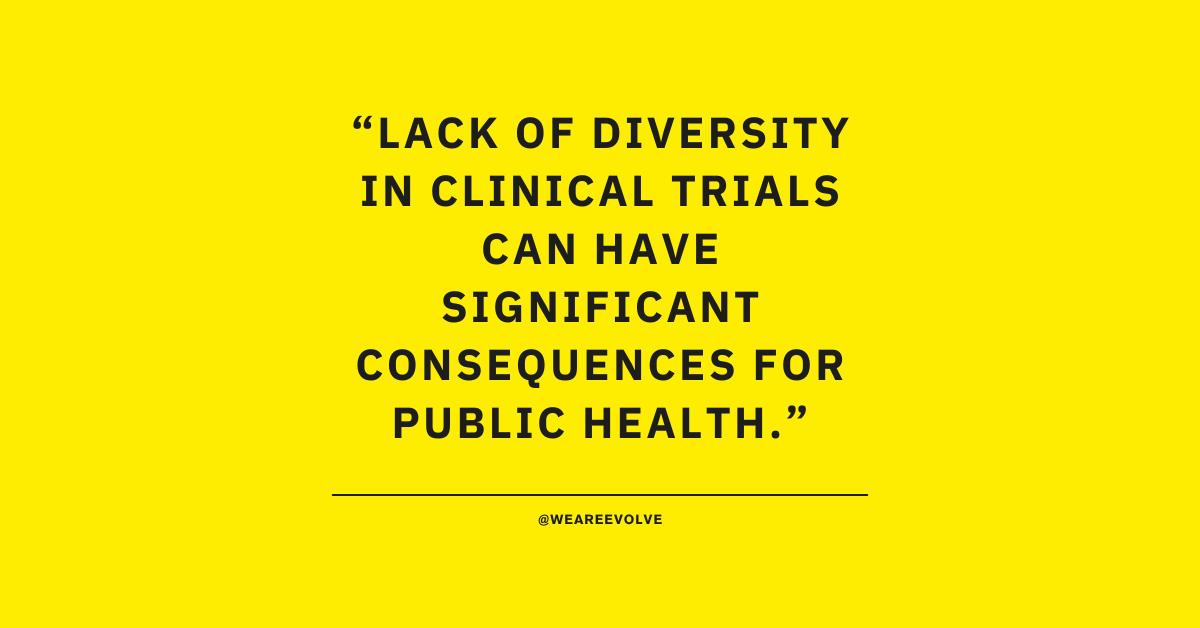Ethics and Inclusivity in Clinical Research
02-09-2024
Clinical trials evaluate the effects of interventions, such as drugs, devices, surgeries, diets, and lifestyle interventions, on health-related biomedical or behavioral outcomes. Trials should be as inclusive as possible to ensure equitable access to research and better reflect the population the intervention being tested is aimed at.
In this article, we look at the importance of inclusive data practices in clinical studies to address bias and ensure that research outcomes are representative of diverse populations. We also explore the ethical considerations within clinical research, exploring the evolving standards and challenges researchers face in maintaining integrity.
Why does inclusivity in clinical research matter?
Most new medications are developed following a series of clinical trials. The most advanced studies are designed to assess both safety and efficacy, or whether a drug works in a large population – ideally, one that includes a diverse group of people. Unfortunately, most trials lack a range of diverse trial participants.
Demographic representation in clinical research is crucial for understanding the safety and effectiveness of novel therapeutics and vaccines in diverse patient populations. In recent years, the National Institutes of Health and Food & Drug Administration have recently issued guidelines and recommendations for the inclusion of women, older adults, and racial and ethnic minorities in research.
Lack of diversity in clinical trials can have significant consequences for public health. If they only include participants from a narrow demographic group, the results may not accurately represent the broader population. This can result in drugs and treatments that are less effective or even harmful for certain groups of people.
A good example of this is the clinical trial for Moderna’s COVID-19 vaccine. Initially, Black Americans represented just 7% of the participants versus the actual figure, which is 13% of the US population, so the company slowed the trial to recruit more participants and provide an accurate balance.
Alongside inclusion of racial and ethnic minority groups, populations experiencing health disparities, such as sexual and gender minority or socioeconomically disadvantaged populations, must be correctly represented too. This increases the validity and transferability of clinical trial results, while also ensuring any benefits of clinical research are distributed evenly.

What are ethical considerations in research?
Ethical considerations are a set of principles that guide your research designs and practices, ensuring scientific integrity, human rights and dignity, and making sure that participation in studies is voluntary, informed, and safe for research subjects. They include voluntary participation, informed consent, anonymity, confidentiality, potential for harm, and communication of results.
Voluntary participation
All research subjects are free to choose to participate without any pressure or coercion, and are able to withdraw from, or leave, the study at any point without feeling an obligation to continue or provide a reason for leaving the study. Voluntary participation is an ethical principle protected by international law and many scientific codes of conduct.
Informed consent
All potential participants must receive and understand all the information they need to decide whether they want to participate, including information about the study’s benefits, risks, funding, and institutional approval.
A consent form is usually provided, including text to read, as well as an opportunity to ask any questions. However, this may not be sufficient for particularly vulnerable groups of people, and the consent form should be explained verbally if data is being collected from people with low literacy before they agree to participate. For children, informed permission for their participation must be gained from their parents or guardians.
Anonymity
Anonymity means no knowledge of who the participants are and no individual participant can be linked to their data. Anonymity can only be guaranteed by not collecting any personally identifying information—for example, names, phone numbers, email addresses, IP addresses, physical characteristics, photos, and videos, but in many cases, it may be impossible to truly anonymize data collection.
Data pseudonymization is an alternative method, identifying information about participants can be replaced by fake identifiers. The data can therefore still be linked to participants but it’s harder to do so because personal information has been separated from the study data.
Confidentiality
All clinical trial participants have a right to privacy. This means all identifying information must be removed and personal data protected for as long as you use or store it. Even when data can’t be collected anonymously, confidentiality should be secured wherever possible.
Potential for harm
It’s key to consider every possible source of harm and ways to mitigate them, as well as to disclose all possible risks of harm to participants before the study to get informed consent.
Harm can come in many different forms, including: physical (pain or injury resulting from study procedures); psychological (sensitive questions or tasks may trigger negative emotions such as shame or anxiety); social (participation can involve social risks, public embarrassment, or stigma); or legal (reporting sensitive data could lead to legal risks or a breach of privacy).
Results communication
The way research results are communicated is important. It should be honest, reliable, credible, and as transparent as possible. Steps should be taken to actively avoid plagiarism and research misconduct wherever possible.
Browser Update Required
This website does not support your current version of Internet Explorer, Please download the recent version from one of the links provided.
Update to Google Chrome Update to Internet Edge